- Home
- Harlan Coben
One False Move: A Myron Bolitar Novel
One False Move: A Myron Bolitar Novel Read online
PRAISE FOR HARLAN COBEN AND
ONE FALSE MOVE
“The fast-paced plot spins the reader in a completely different direction than she expects to go. Myron is gallant, likable, and delightfully original. … His reflections on suburban life and racial divides are poignant and insightful.”
—Los Angeles Times
“The suspense is high in this twisty tale that continues to surprise as it entertains.…Snappy dialogue and Myron’s witty one-liners and wry take on life—and sports—can outshine most stand-up comics.”
—Sun-Sentinel (Fort Lauderdale, Fla.)
“THIS IS ONE OF THE FUNNIEST YET MOST COMPLEX AND CONTEMPLATIVE SERIES TO APPEAR IN AGES … the action is steady, the dialogue so good you wouldn’t miss the action, and the plot a carefully constructed beauty.”
—The Christian Science Monitor
“A WINNER!…Coben displays all the right moves —snappy dialogue, fast pacing, neat plotting.”
—The Orlando Sentinel
“ONE FALSE MOVE HAS IT ALL: wonderful characters, a dandy plot, nail-biting suspense, and Harlan Coben’s wicked humor. I had a great time!”
—Susan Isaacs
“A SATISFYING TANGLE OF SKULDUGGERY … Could Myron, who pushes his wisecracking charm hard, be any more tough and adorable? It’ll be a pleasure waiting for the next installment to find out.”
—Kirkus Reviews
“MYRON BOLITAR IS ONE OF THE MOST ENGAGING HEROES IN MYSTERY FICTION. One False Move is a blast from start to finish.”
—Dennis Lehane
“One False Move marks the maturing of an extraordinary talent in crime fiction. In this rich, poignant novel, Myron Bolitar becomes a complex and memorable character, and Harlan Coben reaches a new level of excellence.”
—Sharyn McCrumb
“ONE FALSE MOVE RATES FOUR STARS. Harlan Coben is the freshest new voice in the crowded mystery-thriller field. Myron and Win are the best duo since Spenser and Hawk, Coben’s plots are gripping and the books have a terrific mix of comedy, suspense and drama.”
—Phillip M. Margolin
“Harlan Coben won three of the major mystery awards last year—the Edgar, Shamus, and Anthony. It was a triple play appropriate to the creator of sports agent Myron Bolitar. In One False Move…Myron and his dashing pal, Win Lockwood, smoothly outmatch a gang of goons. And the plot takes several surprising twists.”
—Mary Higgins Clark Mystery Magazine
“Easily in the running for best-of-the-year honors, a story deftly combining dark suspense with wry humor and pathos.”
—Lansing State Journal
“ENTERTAINING.”
—Detroit Free Press
“THE SUMMER’S MOST INTRIGUING BEACH READ.”
—Women’s Sports & Fitness
“If you’ve been entertaining doubts about the future of the mystery—fuhgeddaboutit! It’s in good hands with Harlan Coben.”
—Lawrence Block
“THE WORLD NEEDS TO DISCOVER HARLAN COBEN. He’s smart, he’s funny and he has something to say.”
—Michael Connelly
“Authentic conversation, colorful characters, and exciting New York and New Jersey surrounds … Strongly recommended.”
—Library Journal
“ONE FALSE MOVE GLEAMS WITH ORIGINALITY, Harlan Coben is a terrific writer, and this a delightful book.”
—Peter Straub
“A cast of extraordinary characters, an emotional roller coaster, a masterpiece of a plot, and a wonderfully wicked humor assures there is not One False Move in Coben’s latest.”
—The Snooper
“HARLAN COBEN DOES EVERYTHING RIGHT in One False Move. The book is very tightly plotted and the subplots dovetail nicely into the basic story line. No minor character is wasted…Coben is writing one of the best humorous hard-boiled series around.”
—Mystery News
Books by Harlan Coben
BACK SPIN
FADE AWAY
DROP SHOT
DEAL BREAKER
ONE FALSE MOVE
THE FINAL DETAIL
DARKEST FEAR
TELL NO ONE
GONE FOR GOOD
In memory of my parents,
Corky and Carl Coben
and in celebration of their grandchildren,
Charlotte, Aleksander, Benjamin, and Gabrielle
CONTENTS
Cover
Other Books By This Author
Title Page
Dedication
Acknowledgments
Prologue
Chapter 1
Chapter 2
Chapter 3
Chapter 4
Chapter 5
Chapter 6
Chapter 7
Chapter 8
Chapter 9
Chapter 10
Chapter 11
Chapter 12
Chapter 13
Chapter 14
Chapter 15
Chapter 16
Chapter 17
Chapter 18
Chapter 19
Chapter 20
Chapter 21
Chapter 22
Chapter 23
Chapter 24
Chapter 25
Chapter 26
Chapter 27
Chapter 28
Chapter 29
Chapter 30
Chapter 31
Chapter 32
Chapter 33
Chapter 34
Chapter 35
Chapter 36
Chapter 37
Epilogue
About the Author
Copyright
ACKNOWLEDGMENTS
I wrote this book alone. Nobody helped me. But if mistakes were made, I wish to keep in the long-standing American tradition of passing the buck. So with that in mind, the author would like to thank the following wonderful people: Aaron Priest, Lisa Erbach Vance, and everyone at the Aaron Priest Literary Agency; Carole Baron, Leslie Schnur, Jacob Hoye, Heather Mongelli, and everyone at Dell Publishing; Maureen Coyle of the New York Liberty; Karen Ross, ME of the Dallas County Institute of Forensic Science; Peter Roisman of Advantage International; Sergeant Jay Vanderbeck of the Livingston Police Department; Detective Lieutenant Keith Killion of the Ridgewood Police Department; Maggie Griffin, James Bradbeer, Chip Hinshaw, and of course, Dave Bolt. Again I repeat: any errors—factual or otherwise—are totally the fault of these people. The author is not to blame.
SEPTEMBER 15
The cemetery overlooked a schoolyard.
Myron pushed at the loose dirt with the toe of his Rockport. There was no stone here yet, just a metal marker holding a plain index card with a name typed in capital letters. He shook his head. Why was he standing here like some cliché from a bad TV show? In his mind’s eye Myron could see how the whole scene should be played out. Torrential rain should be pounding on his back, but he would be too bereaved to notice. His head should be lowered, tears glistening in his eyes, maybe one running down his cheek, blending in with the rain. Cue the stirring music. The camera should move off his face and pull back slowly, very slowly, showing his slumped shoulders, the rain driving harder, more graves, no one else present. Still pulling back, the camera eventually shows Win, Myron’s loyal partner, standing in the distance, silently understanding, giving his buddy time alone to grieve. The TV image should suddenly freeze and the executive producer’s name should flash across the screen in yellow caps. Slight hesitation before the viewers are urged to stay tuned for scenes from next week’s episode. Cut to commercial.
But that would not happen here. The sun shone like it was the first day and the skies had the hue of the freshly painted. W
in was at the office. And Myron would not cry.
So why was he here?
Because a murderer would be coming soon. He was sure of it.
Myron searched for some kind of meaning in the landscape but only came up with more clichés. It had been two weeks since the funeral. Weeds and dandelions had already begun to break through the dirt and stretch toward the heavens. Myron waited for his inner voice-over to spout the standard drivel about weeds and dandelions representing cycles and renewal and life going on, but the voice was mercifully mute. He sought irony in the radiant innocence of the schoolyard—the faded chalk on black asphalt, the multicolor three-wheelers, the slightly rusted chains for the swings—cloaked in the shadows of tombstones that watched over the children like silent sentinels, patient and almost beckoning. But the irony would not hold. Schoolyards were not about innocence. There were bullies down there too and sociopaths-in-waiting and burgeoning psychoses and young minds filled prenatally with undiluted hate.
Okay, Myron thought, enough abstract babbling for one day.
On some level, he recognized that this inner dialogue was merely a distraction, a philosophical sleight of hand to keep his brittle mind from snapping like a dry twig. He wanted so very much to cave in, to let his legs give way, to fall to the ground and claw at the dirt with his bare hands and beg forgiveness and plead for a higher power to give him one more chance.
But that too would not happen.
Myron heard footsteps coming up from behind him. He closed his eyes. It was as he expected. The footsteps came closer. When they stopped, Myron did not turn around.
“You killed her,” Myron said.
“Yes.”
A block of ice melted in Myron’s stomach. “Do you feel better now?”
The killer’s tone caressed the back of Myron’s neck with a cold, bloodless hand. “The question is, Myron, do you?”
AUGUST 30
Myron hunched his shoulders and slurred his words. “I am not a baby-sitter,” he said. “I am a sports agent.”
Norm Zuckerman looked pained. “Was that supposed to be Bela Lugosi?”
“The Elephant Man,” Myron said.
“Damn, that was awful. And who said anything about being a baby-sitter? Did I say the word baby-sitter or baby-sitting or for that matter any form of the verb to baby-sit or noun or even the word baby or the word sit or sat or—”
Myron held up a hand. “I get the point, Norm.”
They sat under a basket at Madison Square Garden in those cloth-and-wood directors’ chairs that have stars’ names on the back. Their chairs were set high so that the net from the basket almost tickled Myron’s hair. A model shoot was going on at half-court. Lots of those umbrella lights and tall, bony women-cum-children and tripods and people huffing and fluffing about. Myron waited for someone to mistake him for a model. And waited.
“A young woman may be in danger,” Norm said. “I need your help.”
Norm Zuckerman was approaching seventy and as CEO of Zoom, a megasize sports manufacturing conglomerate, he had more money than Trump. He looked, however, like a beatnik trapped in a bad acid trip. Retro, Norm had explained earlier, was cresting, and he was catching the wave by wearing a psychedelic poncho, fatigue pants, love beads, and an earring with a dangling peace sign. Groovy, man. His black-to-gray beard was unruly enough to nest beetle larvae, his hair newly curled like something out of a bad production of Godspell.
Che Guevara lives and gets a perm.
“You don’t need me,” Myron said. “You need a bodyguard.”
Norm waved a dismissing hand. “Too obvious.”
“What?”
“She’d never go for it. Look, Myron, what do you know about Brenda Slaughter?”
“Not much,” Myron said.
He looked surprised. “What do you mean, not much?”
“What word are you having trouble with, Norm?”
“For crying out loud, you were a basketball player.”
“So?”
“So Brenda Slaughter may be the greatest female player of all time. A pioneer in her sport—not to mention the pinup girl, pardon the political insensitivity, for my new league.”
“That much I know.”
“Well, know this: I’m worried about her. If something happens to Brenda Slaughter, the whole WPBA—and my substantial investment—could go right down the toilet.”
“Well, as long as it’s for humanitarian reasons.”
“Fine, I’m a greedy capitalist pig. But you, my friend, are a sports agent. There is not a greedier, sleazier, slimier, more capitalist entity in existence.”
Myron nodded. “Suck up to me,” he said. “That’ll work.”
“You’re not letting me finish. Yes, you’re a sports agent. But a damn fine one. The best, really. You and the Spanish shiksa do incredible work for your clients. Get the most for them. More than they should get really. By the time you finish with me, I feel violated. Hand to God, you’re that good. You come into my office, you rip off my clothes and have your way with me.”
Myron made a face. “Please.”
“But I know your secret background with the feds.”
Some secret. Myron was still hoping to bump into someone above the equator who didn’t know about it.
“Just listen to me for a second, Myron, okay? Hear me out. Brenda is a lovely girl, a wonderful basketball player—and a pain in my left tuchis. I don’t blame her. If I grew up with a father like that, I’d be a pain in the left tuchis too.”
“So her father is the problem?”
Norm made a yes-and-no gesture. “Probably.”
“So get a restraining order,” Myron said.
“Already done.”
“Then what’s the problem? Hire a private eye. If he steps within a hundred yards of her, call the cops.”
“It’s not that easy.” Norm looked out over the court. The workers involved in the shoot darted about like trapped particles under sudden heat. Myron sipped his coffee. Gourmet coffee. A year ago he never drank coffee. Then he started stopping into one of the new coffee bars that kept cropping up like bad movies on cable. Now Myron could not go through a morning without his gourmet coffee fix.
There is a fine line between a coffee break and a crack house.
“We don’t know where he is,” Norm said.
“Excuse me?”
“Her father,” Norm said. “He’s vanished. Brenda is always looking over her shoulder. She’s terrified.”
“And you think the father is a danger to her?”
“This guy is the Great Santini on steroids. He used to play ball himself. Pac Ten, I think. His name is—”
“Horace Slaughter,” Myron said.
“You know him?”
Myron nodded very slowly. “Yeah,” he said. “I know him.”
Norm studied his face. “You’re too young to have played with him.”
Myron said nothing. Norm did not catch the hint. He rarely did.
“So how do you know Horace Slaughter?”
“Don’t worry about it,” Myron said. “Tell me why you think Brenda Slaughter is in danger.”
“She’s been getting threats.”
“What kind of threats?”
“Death.”
“Could you be a little more specific?”
The photo shoot frenzy continued to whirl. Models sporting the latest in Zoom wear and oodles of attitude cycled through poses and pouts and postures and pursed lips. Come on and vogue. Someone called out for Ted, where the hell is Ted, that prima donna, why isn’t Ted dressed yet, I swear, Ted will be the death of me yet.
“She gets phone calls,” Norm said. “A car follows her. That kind of thing.”
“And you want me to do what exactly?”
“Watch her.”
Myron shook his head. “Even if I said yes—which I’m not—you said she won’t go for a bodyguard.”
Norm smiled and patted Myron’s knee. “Here’s the part where I lure you in. Like a fi
sh on a hook.”
“Original analogy.”
“Brenda Slaughter is currently unagented.”
Myron said nothing.
“Cat got your tongue, handsome?”
“I thought she signed a major endorsement deal with Zoom.”
“She was on the verge when her old man disappeared. He was her manager. But she got rid of him. Now she’s alone. She trusts my judgment, to a point. This girl is no fool, let me tell you. So here’s my plan: Brenda will be here in a couple of minutes. I recommend you to her. She says hello. You say hello. Then you hit her with the famed Bolitar charm.”
Myron arched one eyebrow. “Set on full blast?”
“Heavens, no. I don’t want the poor girl disrobing.”
“I took an oath to only use my powers for good.”
“This is good, Myron, believe me.”
Myron remained unconvinced. “Even if I agreed to go along with this cockamamy scheme, what about nights? You expect me to watch her twenty-four hours a day?”
“Of course not. Win will help you there.”
“Win has better things to do.”
“Tell that goy boy-toy it’s for me,” Norm said. “He loves me.”
A flustered photographer in the great Eurotrash tradition hurried over to their perch. He had a goatee and spiky blond hair like Sandy Duncan on an off day. Bathing did not appear to be a priority here. He sighed repeatedly, making sure all in the vicinity knew that he was both important and being put out. “Where is Brenda?” he whined.
“Right here.”
Myron swiveled toward a voice like warm honey on Sunday pancakes. With her long, purposeful stride—not the shy-girl walk of the too-tall or the nasty strut of a model—Brenda Slaughter swept into the room like a radar-tracked weather system. She was very tall, over six feet for sure, with skin the color of Myron’s Starbucks Mocha Java with a hefty splash of skim milk. She wore faded jeans that hugged deliciously but without obscenity and a ski sweater that made you think of cuddling inside a snow-covered log cabin.

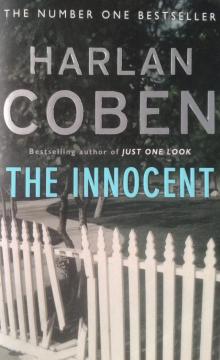 The Innocent
The Innocent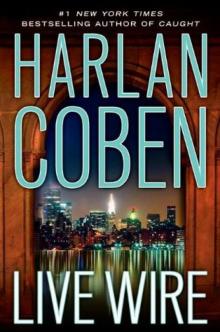 Live Wire
Live Wire Play Dead
Play Dead Drop Shot
Drop Shot Seconds Away
Seconds Away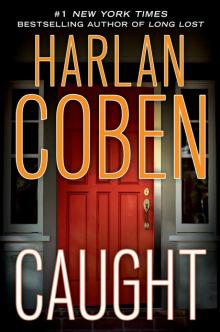 Caught
Caught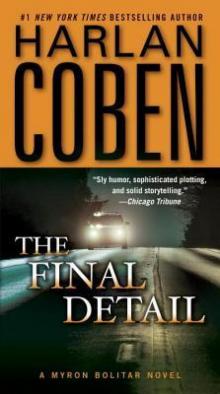 The Final Detail
The Final Detail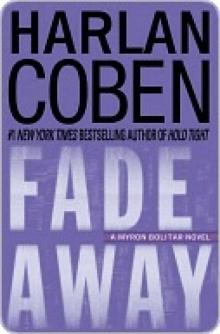 Fade Away
Fade Away Home
Home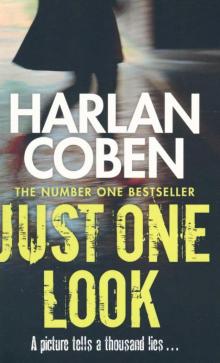 Just One Look
Just One Look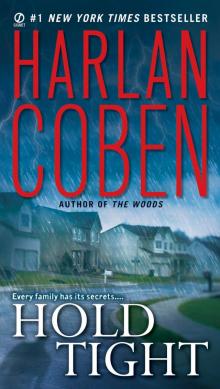 Hold Tight
Hold Tight Fool Me Once
Fool Me Once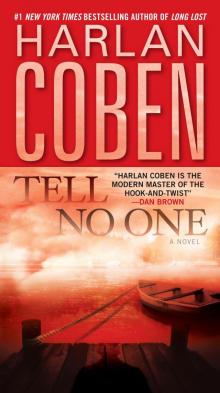 Tell No One
Tell No One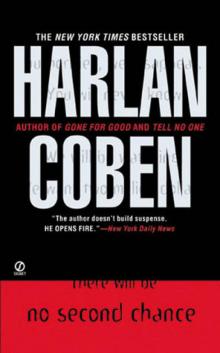 No Second Chance
No Second Chance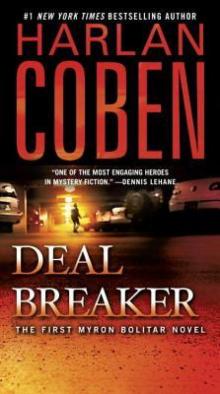 Deal Breaker
Deal Breaker Long Lost
Long Lost One False Move
One False Move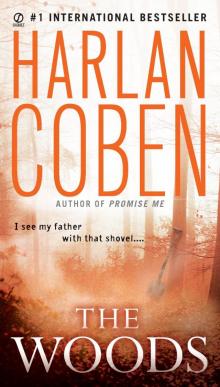 The Woods
The Woods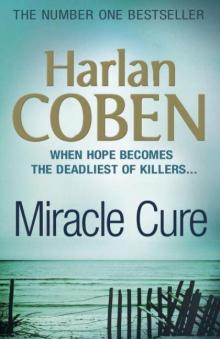 Miracle Cure
Miracle Cure Found
Found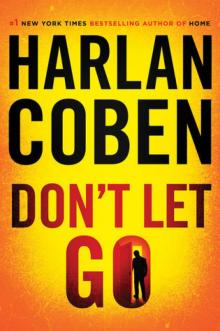 Don't Let Go
Don't Let Go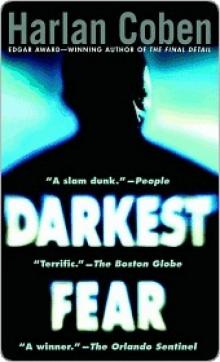 Darkest Fear
Darkest Fear The Stranger
The Stranger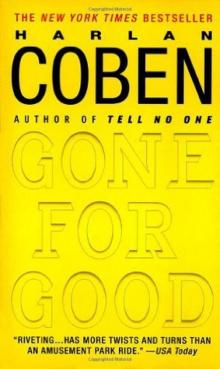 Gone for Good
Gone for Good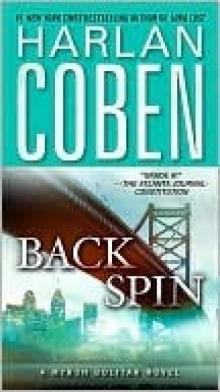 Back Spin
Back Spin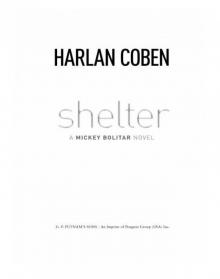 Shelter
Shelter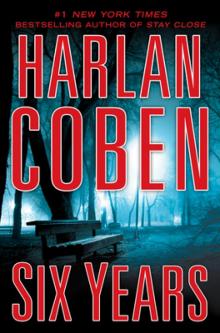 Six Years
Six Years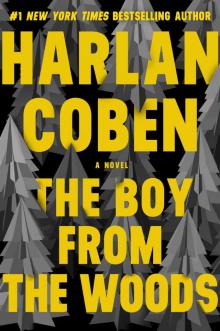 The Boy from the Woods
The Boy from the Woods Missing You
Missing You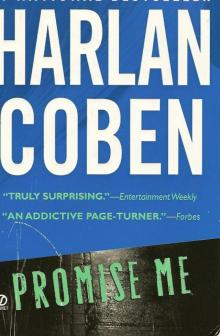 Promise Me mb-8
Promise Me mb-8 The Final Detail: A Myron Bolitar Novel
The Final Detail: A Myron Bolitar Novel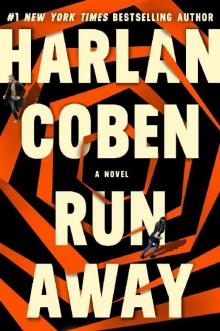 Run Away
Run Away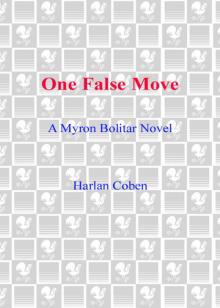 One False Move: A Myron Bolitar Novel
One False Move: A Myron Bolitar Novel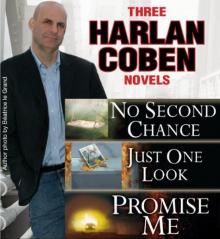 Three Harlan Coben Novels
Three Harlan Coben Novels the Woods (2007)
the Woods (2007) Tell No One (2001)
Tell No One (2001) the Innocent (2005)
the Innocent (2005)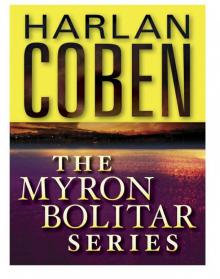 The Myron Bolitar Series 7-Book Bundle
The Myron Bolitar Series 7-Book Bundle Gone for Good (2002)
Gone for Good (2002) Caught (2010)
Caught (2010) Hold Tight (2008)
Hold Tight (2008)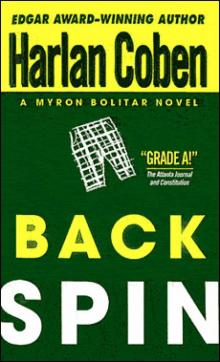 04 - Back Spin
04 - Back Spin Miracle Cure (1991)
Miracle Cure (1991) Harlan Coben 3 Novel Collection
Harlan Coben 3 Novel Collection Just One Look (2004)
Just One Look (2004)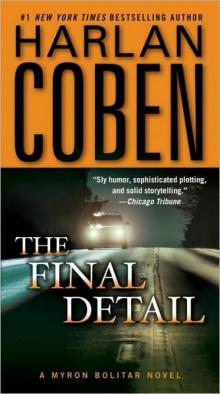 The Final Detail mb-6
The Final Detail mb-6 Play Dead (2010)
Play Dead (2010)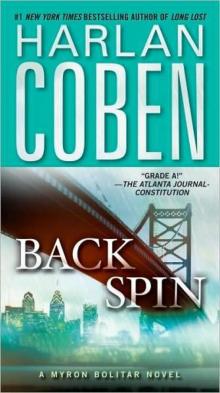 Back Spin mb-4
Back Spin mb-4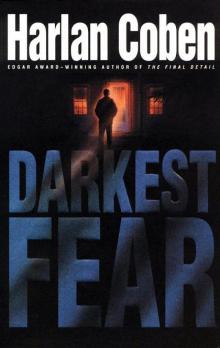 Darkest Fear mb-7
Darkest Fear mb-7